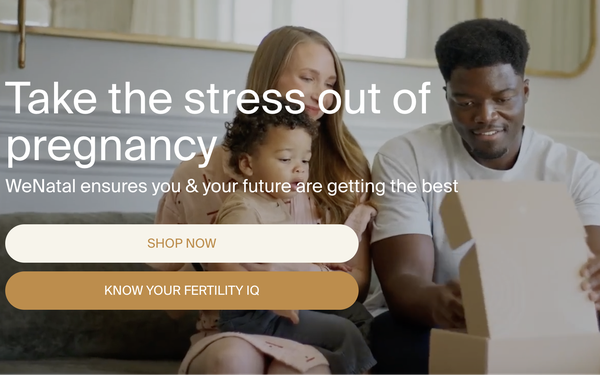
Do a search for men’s prenatal
vitamins or supplements and, surprisingly, you’ll find lots of options.
But the category reportedly didn’t exist until the 2022 launch of WeNatal, according to the brand’s
co-founders, Ronit Menashe and Vida Delrahim.
A couple of years earlier, both women had experienced miscarriages a week apart, but weren’t satisfied with the explanations -- or lack
thereof -- that they received from the medical system.
CEO Menashe, then working as director of operations for supplement marketer Hyman Enterprises, began looking for a root cause. “We
learned that men are 50% of the fertility equation,” she recalled, “and that when men take high-dose antioxidants like CoQ10, NAC, and vitamin E, they have a five times higher chance of
getting their partner pregnant. The antioxidants support sperm quality, and that in turn supports pregnancy health.”
advertisement
advertisement
As a result, Menashe and CMO Delrahim, then a senior marketing
director at Nike, began developing the WeNatal line, whose flagship products - -WeNatal for Him and WeNatal for Her -- are also sold together as, of course, WeNatal Together.
Before launch,
Menashe and her husband began using the nascent product and, three months later, “I got pregnant at the age of 42 with Emma. Then Vida six months later got pregnant with Devina.”
They also conducted a small beta test of 10 couples, Menashe said, and at the end of three months, men’s sperm parameters like quality, count and motility had all increased. “It’s
a little bit harder to track fertility,” she admitted, “but we did hear from our women that they felt better, their cycles had stabilized, they had more energy, etc.”
Acknowledging that such a small sample size makes it hard to draw conclusions, Menashe said she’s looking forward to the results of clinical tests now underway with Citruslabs, a specialist
in such work for CPG products.
The WeNatal line is sold only online. Outlets include the company’s own website and the sites of such partnering medical advisors as Dr. Mark Hyman ,
who helped develop the formulations, and nutritionist Kelly Leveque.
Medical experts also played a key role in WeNatal’s marketing.
“So many of these practitioners already
had followings of people that love and trust them, so their endorsement really kicked off our brand in the most powerful way,” said Menashe.
“Now we’re starting to see brand
awareness triple as we have more OBGyns, fertility doctors and urologists recommending us,” she added, noting that WeNatal considers such experts “the true influencers.”
The
partners also credit social media, a strong newsletter email list, and community-building with helping drive sales.
A free downloadable guide for couples of “nine lifestyle choices you
can make to improve your odds of healthy pregnancy” has been a key builder of the email list.
“When launch time came, we sent an email to people that had joined our newsletter
list, and hundreds of people subscribed that day,” said Menashe.
The newsletter continues as an important marketing tool. New visitors to WeNatal.com see an “Enter WeNatal
Giveaway” tab, which, in exchange for providing an email address, offers the chance to win a package of WeNatal’s product lineup, awarded to one winner quarterly.
Other
community-building tools include a just-launched free 11-episode ”Master Class” on fertility subjects, with each episode between 45 minutes and an hour. The partners hope to launch a
second series in a couple of months.
WeNatal has also engaged a PR firm, resulting in coverage by such publications as Motherly.
“We’ve grown organically without any
ads,” Menashe bragged, and WeNatal has no current plans to use paid media.
“Our formula is working for us” she stated. “We’re going to continue to nurture and
create amazing experiences for our community.”
One of those experiences came up unexpectedly in January when Menashe lost her home to the Los Angeles wildfires.
“Before Ronit even knew where she was going to stay or live,” Delrahim recalled, “the first thing she did was call me and say, ‘so many people in the Pacific Palisades
area, so many of our customers, so many of our friends, we need to help them, they need to stay healthy.’”
So WeNatal published a form “where anyone who had lost their home,
was displaced and needed their supplements could just fill it out.” The effort has resulted in $25,000 worth of product being distributed to more than 300 families.
“We were so
stressed, barely eating, barely sleeping,” said Menashe. “One thing we could do for our health is take supplements, because we need to function.”
Yes, many people use WeNatal
beyond fertility purposes. While designed for prenatal through postpartum, the products can also function as multivitamins.
“We didn’t realize how many men are going to want to
stay on our prenatal,” noted Menashe. “When you’re taking these antioxidants to improve your overall health and your overall sperm, you start feeling good, you start having focus,
your hair starts growing, you start having libido.”
Making the process of staying on the supplements easier for women is that while other brands have separate products for before, during
and after pregnancy, WeNatal has just one formula. “We wanted to create a simple solution for the consumer,” said Delrahim. “It’s such a stressful, overwhelming
time… [so it’s better to] not overcomplicate things for them. “
WeNatal has “reimagined” the fertility experience, said Delrahim ,“to make sure that
couples are taking the burden of fertility together, that the burden isn’t explicitly placed on women.”
“We didn’t create this brand because we said,
‘There’s a big opportunity in the fertility space,” said Menashe. “We came to it from our own personal journey, and we really want to make an impact. I think when
you’re genuine about what you do, success comes from that.”